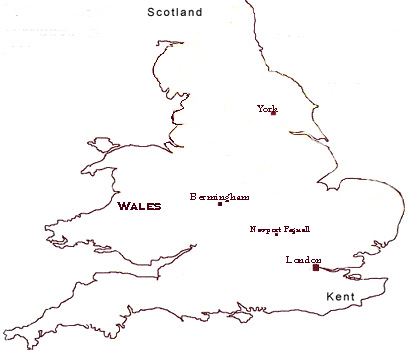|
Site Index
|
|
About us
|
|
Links
|
|
Email
|
|
Database
|
|
Home Page
|
England prior to 1550 had many troubles. From the famine and plague of the late 1300s, there was the War of the Roses in the 1400s. Finally in the late 1500s the long reign of Elizabeth I gave England stability for 30 years. By 1603 at the time of Elizabeth's death, England was secure, the european adventures of earlier monarchs were past, the country could support an increasing population and the beginnings of a common law and a powerful parliament prepared the country for an outward expansion. As the Trueloves were not lords or politicians there is little mention of them in the history books. However, they were there. The main references are from recorded wills and memorials.

The Trueloves and virtually most common folk disappear
from 1350 to the early 1500s.
By the 1500s, we start to have traces of the Trueloves re-emerging.
If we did start from the norsemen, then the two obvious groups are
the north group around York and the south group around Essex. By the
late 1500s they are spreading. In the south, there are mentions of
Trueloves in Kent, Sussex, Surrey and of course London itself, In
the north, Yorkshire, Linconshire and Northhamshire and Buckinghamshire.
They are property owners in the south of England in Essex, Sussex,
Kent and London. The Surrey Trueloves are more common folk. In the
north in the old Norse areas they are also common folk.
By the 1600s some of the northern Trueloves are small landowners,
but the majority are agricultural labourers They are centred around
York, Birmingham and Nottingham. In Sussex and Kent, land holders
and minor gentry. In Essex, definitely land holders with legal battles
over inheritances. In London, property owners, ship captains, doctors
and industrialists. In Surrey, there is at least one family owning
property, while the other families remain agricultural labourers.
It is during this period that migration to Northern America starts
and James Rowland Truelove appears.
Given that the southern Trueloves were in favour
with the crown they would have retained their properties and been
in a position to gain more. Thomas Truelove, father of Eden Baker
(nee Truelove) had property in Sussex. Eden Truelove married into
a propertied family in 1692.
By the 1700s it appears the Trueloves had settled down and apart from
migration to the new world, they stayed where they were born. This
may have been caused by the political events of the time. I would
suggest our two separate Truelove groups, the northerners who spread
southwards from Yorkshire and the southerners who spread south and
east from Essex were not aware of each other. The Essex Trueloves
continued with legal battles over property and had ship captains in
their ranks. The northern Trueloves were generally butchers, bakers,
iron smiths and the ocassional beer shop owner.
There are many mentions of Trueloves
in this period and the most frustrating part of it is there are no
apparent genealogy.
In this century, there are so many William and John Trueloves with a few Thomas' thrown in, it is
impossible to make a connection between most of them. However, we have three known family lines
which start in this time. You can find them in the Genealogy Page.
|
This
website is hosted on www.australia-limited.net
2015 |